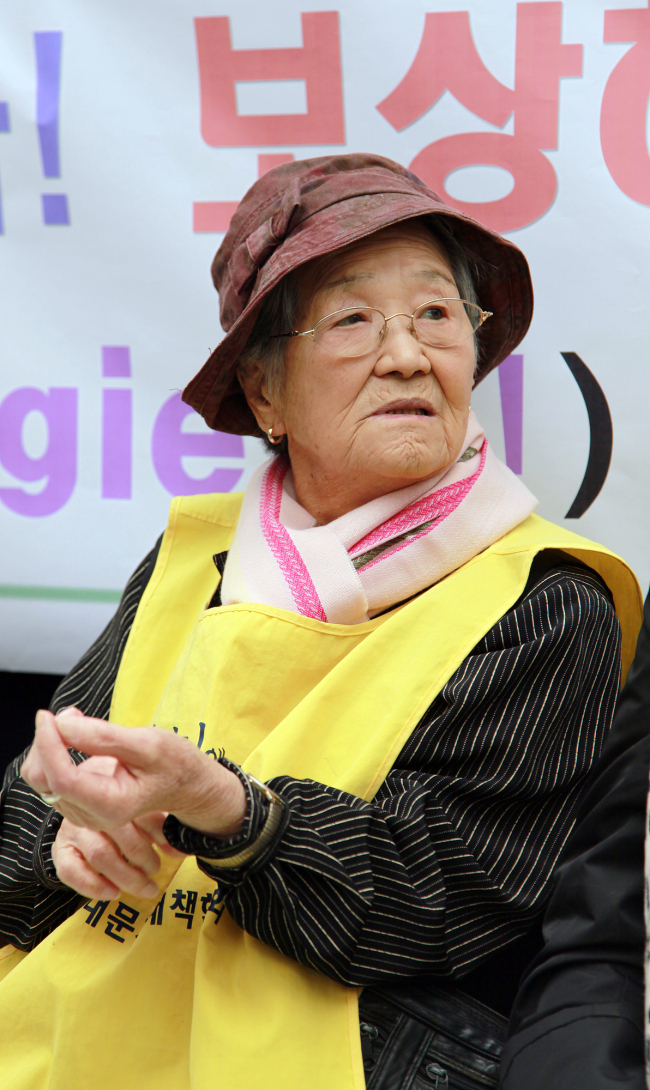Lee Yong-nyeo, one of the few surviving victims of Japan’s military sex slavery and a leading activist who sought for truth, an apology and compensation, has died Sunday.
The House of Sharing, a shelter for the “comfort women” in Gwangju, Gyeonggi Province, said Lee died at a hospital early Sunday morning. She was 87.
The House of Sharing, a shelter for the “comfort women” in Gwangju, Gyeonggi Province, said Lee died at a hospital early Sunday morning. She was 87.

At the age of 16, Lee was shipped from Busan to Yangon, Myanmar, where she was forced to provide sexual services to Japanese soldiers during World War II.
Since 1995, after moving to the shelter, Lee has been actively involved in protesting against Japan’s wartime sexual enslavement.
In 2000, Lee participated in a demonstration in Japan with other surviving former comfort women, demanding an apology and compensation from the Japanese government.
Her testimony in Tokyo eventually led to the creation of the Women’s International War Crimes Tribunal on Japan’s Military Sexual Slavery at the International Criminal Court in The Hague, Netherlands.
Last year, she filed a lawsuit against a Japanese right-winger accused of vandalizing a statue dedicated to comfort women. Also, she has regularly participated in the weekly Wednesday demonstrations held in front of the Japanese embassy in Seoul. The House of Sharing said Lee, who moved to her son’s house last year, was hospitalized recently due deteriorating health.
Nearly seven decades after the Korean Peninsula was liberated from Japan’s colonial Tokyo’s compensations for Korean comfort women remain unsolved.
Tokyo argues that there is no clear evidence that comfort women were forcibly mobilized by its military. It stressed civilian entities were to blame for the crimes, turning a deaf ear to the victims’ calls for an apology and compensation.
Korea’s constitutional court in 2011 ordered the Seoul government to reopen negotiations with Japan and help the women settle their disputes, saying that failing to do more violated the basic rights of these women.
In recent years, Seoul has stressed that the issue should quickly be resolved as many of the victims, mostly in their late 80s, have died of old age.
Some 200,000 mostly-Asian women were believed forced into sexual slavery by the Japanese Army during WWII: Only about 1,300 of them are still alive across the world, and only 55 state-registered former comfort women are alive in Korea.
By Oh Kyu-wook (596story@heraldcorp.com)
-
Articles by Korea Herald








![[From the Scene] Monks, Buddhists hail return of remains of Buddhas](http://res.heraldm.com/phpwas/restmb_idxmake.php?idx=644&simg=/content/image/2024/04/19/20240419050617_0.jpg&u=20240419175937)






![[From the Scene] Monks, Buddhists hail return of remains of Buddhas](http://res.heraldm.com/phpwas/restmb_idxmake.php?idx=652&simg=/content/image/2024/04/19/20240419050617_0.jpg&u=20240419175937)

![[KH Explains] Hyundai's full hybrid edge to pay off amid slow transition to pure EVs](http://res.heraldm.com/phpwas/restmb_idxmake.php?idx=652&simg=/content/image/2024/04/18/20240418050645_0.jpg&u=20240419100350)

![[Today’s K-pop] Illit drops debut single remix](http://res.heraldm.com/phpwas/restmb_idxmake.php?idx=642&simg=/content/image/2024/04/19/20240419050612_0.jpg&u=)